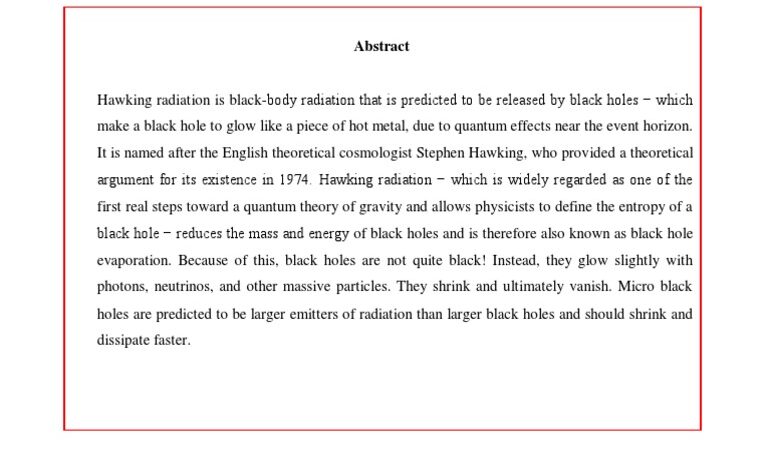The concept of black holes has long captured the imagination of scientists and people alike. Among the various phenomena associated with these cosmic entities, Hawking radiation stands out as a particularly intriguing topic, raising fundamental questions about the nature of energy conservation in the universe. This phenomenon, proposed by physicist Stephen Hawking in 1974, hypothesizes that black holes are not completely black but emit radiation due to quantum effects near their event horizons. This revelation has spurred numerous discussions regarding its implications on the principle of energy conservation.
At the core of the inquiry regarding Hawking radiation’s potential violation of energy conservation lies an essential observation: black holes, traditionally understood as objects whose gravitational pull is so intense that not even light can escape them, can theoretically lose mass over time. This mass loss corresponds to the energy emitted as radiation. The juxtaposition of mass and energy here is critical, as it invokes Einstein’s famous equation, E=mc², suggesting a transformation of mass into energy.
Hawking radiation emerges from the interplay of quantum mechanics and gravitational physics. In the vacuum of space, pairs of virtual particles are constantly being created and annihilated. Near the event horizon of a black hole, it is theoretically possible for one particle of this virtual pair to be captured by the black hole while the other escapes into space. The escaping particle manifests as Hawking radiation. Consequently, the black hole loses energy equivalent to the energy of the particle that escapes, thereby resulting in a reduction of its mass. This intriguing mechanism does not violate energy conservation; rather, it exemplifies the intricate balance between energy and mass inherent in the universe.
However, the implications extend far beyond mere theoretical curiosity. The existence of Hawking radiation leads to two considerable consequences. First, it suggests that black holes can evaporate over time, ultimately leading to their disappearance. This evaporation introduces a dynamic dimensionality to black holes, which were once thought to be eternal. The notion that black holes have a lifespan raises significant philosophical and scientific questions about the fate of information and matter consumed by these entities, challenging the conventional understanding of permanence in cosmic phenomena.
Second, Hawking radiation also implies that observing the universe at cosmic scales is fundamentally influenced by quantum processes. As black holes emit radiation, they can create a thermal spectrum indicative of their temperature, which is inversely proportional to their mass; smaller black holes emit more radiation and are thus hotter. This temperature characteristic allows astrophysicists to gain insights into the properties of black holes, owing to the link between temperature, energy, and their quantum behavior.
The implications of these revelations permeate various fields of physics, particularly concerning entropy and information theory. Entropy, a measure of disorder or randomness in a system, is pivotal to the second law of thermodynamics, which posits that entropy tends to increase over time in an isolated system. The process by which black holes evaporate through Hawking radiation introduces an interesting twist to this principle. If black holes can lose mass and radiate energy, how is the information contained within them preserved? This question, often termed the “black hole information paradox,” challenges our comprehension of fundamental laws governing the universe.
Delving deeper, one uncovers the philosophical inquiries intertwined with this scientific anomaly. The relationship between information and the physical state of a black hole raises existential questions about the universe’s fabric. Does it affirm the premise that information is never truly lost, merely transformed or degraded into a different state? As physicists continue to grapple with these quandaries, the interplay between Hawking radiation and energy conservation remains emblematic of the boundary where physics and philosophy converge.
Moreover, considering black holes from an ecological perspective reveals fascinating parallels. The preservation and conservation of information about the matter absorbed into black holes serve as an allegory for maintaining the integrity of environmental information lost in the wake of climate change. Just as one can argue for the obligation to safeguard the information contained within the fabric of the universe, a corresponding moral imperative exists to preserve our planet’s ecological balance. When we allow for the degradation of natural systems, we confront not just loss but a diminishment of knowledge concerning the complex networks that sustain life.
Ultimately, while Hawking radiation does not violate the principle of energy conservation, it invites an exploration of the nuances of physics, especially as they intertwine with philosophical implications. Black holes, through their enigmatic properties, prompt humanity to reconsider the foundational bedrock of scientific inquiry, igniting curiosity and challenging assumptions. This inquiry transcends the realms of theoretical physics, echoing across disciplines as it encourages an appreciation for the complexities of existence, environmental stewardship, and the quest for knowledge.
As research into black holes and Hawking radiation progresses, the dialogue surrounding energy conservation and information theory will undoubtedly evolve, highlighting the need for continued exploration within the structured confines of physical laws and their wider implications on our understanding of reality. The lessons drawn from studying black holes resonate resoundingly with contemporary challenges, urging a dual commitment to understanding the cosmos and nurturing the earth.








